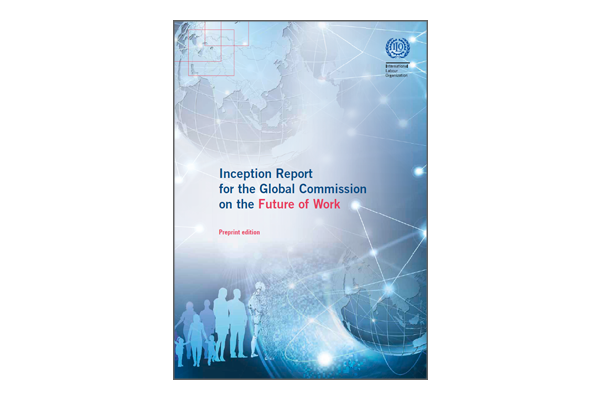Informe inicial para la Comisión Mundial sobre el Futuro del Trabajo (OIT, 2017)

Traducir:
Foreword
Almost one hundred years ago, in the wake of World War I, the International Labour Organization (ILO) was founded to achieve social justice in the pursuit of universal and lasting peace. The quest for workers’ well-being: physical, moral, and intellectual (Philadelphia Declaration, 1944) has encountered many obstacles along the way. But the ILO has performed at its best when confronted with the most difficult of challenges. In the midst of World War II, President Roosevelt of the United States, looking back at the founders’ “wild dream” of raising labour standards “on an international plane” and the “wilder [dream] still” of tripartism, called on the ILO “to play an essential part” in re-establishing social justice (Rodgers et al., 2009). During the most recent global financial and economic crisis, country leaders called on the ILO to ensure that recovery measures “promoted jobs” and “protected people”. We have achieved remarkable progress in economic well-being, poverty reduction and political democracy; but much work remains.
As the ILO approaches it centenary in 2019, the stakes are high – and intensifying – with respect to the importance of achieving social justice. Concern about economic growth and human progress is growing as inequality, insecurity and exclusion – which imperil lives and livelihoods and pose existential threats to social organization and democratic societies – become more widespread. Beyond 2019, the mandate to achieve the 2030 Agenda for Sustainable Development and its 17 Sustainable Development Goals (SDGs) adds urgency and opportunity to the ILO’s tasks, and underscores the critical role of environmental sustainability in creating decent work and an inclusive global economy.
At the same time, as a result of climate change, demographic shifts, technological change and, more broadly, globalization, we are witnessing transformations in the world of work at an unprecedented pace and scale. How do we harness these challenges to provide opportunities for achieving social justice in an increasingly complex world of work?
The ILO’s Future of Work Centenary Initiative allows us to take a step back, providing the space to reflect on the profound challenges that lie ahead and how the ILO with its member States can best meet them and develop the future we want as we enter our second century. The Global Commission lies at the heart of this Initiative. The national dialogues in 110 of our member States, which preceded the Commission’s work and whose results are now synthesized in a report, provide a rich discussion of priorities, challenges and opportunities at the national and international levels.
The Commission brings together policy-makers, thinkers, advocates, researchers and social partners, under the leadership of its two distinguished Co-Chairpersons, to provide guidance and recommendations for achieving our mandate as we move into our second century. We know that there is no one single Future of Work, even if our futures are ever more strongly interdependent. Challenges facing member States are very much a product of history, demography, culture and, most importantly, level of economic and social development, as the national dialogues reveal. The diversity within the Commission reflects this critical dynamic.
I urge you to probe deeply those issues that you decide are most important for achieving the ILO’s mandate. Both the Office and I welcome bold thinking that challenges the ILO’s traditional wisdom as well as innovative policy recommendations that may require new approaches. The Office will endeavour to provide you with solid research in these areas and to support all aspects of your work.
This Inception Report raises the curtain on the work of the Global Commission. In keeping with the broad scope we hope you will bring to your work, it deliberately avoids steering the Commission’s deliberations towards specific issues or prejudging the nature of your guidance regarding the profound changes in the world of work and the development of a common vision of the future of work we want. Instead, the Report tries to set the stage for a rich discussion culminating in a Commission Report for the ILO centenary year, 2019.
To that end, we have organized the Inception Report as follows: Chapter 1 provides a snapshot of the mega trends affecting the world of work today. Chapter 2 examines the meaning of work for individuals and society. Chapter 3 discusses the ways in which technology and other trends are affecting job creation. Chapter 4 looks at the organization of work and production. Finally, Chapter 5 discusses the governance of work.
We are grateful for the hard work you will undertake to help guide the ILO during its second century in its quest for social justice.
Guy Ryder, ILO Director-General

